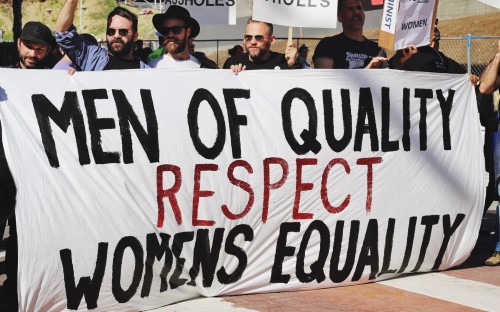Now, the Forté Foundation—a non-profit working to create opportunities for women in business—has launched a new initiative to hopefully ignite the institutional change needed to create a level gender playing field.
The Men as Allies scheme—sponsored by Carnegie Mellon’s Tepper School of Business, Johnson at Cornell University, and Georgetown University’s McDonough School of Business—aims to launch male ally groups on campus—similar to Harvard Business School’s MBA ‘Manbassadors’—to take the gender equality conversation forward and enact meaningful institutional change.
“It’s been somewhat of an organic movement on campuses between a handful of business schools,” says Elissa Sangster, the executive director of Forté, “and I believe Harvard led the way with their Manbassador group.”
Since Harvard’s Manbassador initiative, a whole host of US business schools have launched similar schemes—they include Columbia, Duke Fuqua, Kellogg, NYU Stern, UCLA Anderson, Chicago Booth, Michigan Ross, Wharton, and Stanford.
American business schools might be leading the way, but as we know, the problem of gender inequality extends beyond the shores of the US; it is a global issue that needs the support of business schools the world over. On International Women’s Day, surely there is no better time to push the message to Europe, the UK, and beyond, that business schools need amalgamate.
Forté have produced a toolkit that explains how business schools can go about designing their own male ally initiatives.
“We’re working at the culture of business school,” adds Elissa, “and many changes have been made over the last decade-to-15-years—this conversation brings women and men together in terms of how business schools need to change.”
Introducing male ally groups on campus can lead to better leaders, as students learn to understand the rapid change of attitude towards gender equality, and how to manage that in the workplace; it invites men to pay attention, putting more emphasis on the need for change on business school campuses; and by incorporating the groups into Women in Business clubs, ensures men make up the second half of the gender equality equation.
What Elissa adds is that this goes beyond the “blatant and illegal” sexual harassment recently highlighted in the media—“it’s a different kind of story about the workforce and how to think more in a gender balanced way,” she says.
Forté is involved in meeting corporate school sponsors, with an end goal of encouraging them to do something to support the efforts on campus.
The organization hopes to open dialogue between men and women in a corporate space—not just within the confines of a business school campus—to get them talking about what men can do to advocate change and support gender equity within organizations.
“The job of business schools is to create the future leaders of business,” says Elissa, “and this program (Men as Allies) is miles ahead of what companies are doing.”
Elissa admits that in companies a lot of training is happening at the leadership level, or for people highlighted for leadership positions—what companies are failing to do is bring the equality conversation into entry level positions.
“The Men as Allies initiative is such a positive effort to address these topics, [but] I would like to see companies do more to give men a voice, so they don’t lose this mentality after leaving campus,” she explains.
Organizations themselves stand to benefit from harnessing the gender equity conversation through every tier of their business—research by the Peterson Institute for International Economics, and EY, reported that businesses with 30% female leaders could add up to six percentage points to its net profit margin—which is why Forté are trying to push the conversation into the corporate space.
“Companies can learn from these students, by giving men a chance to be leaders in a unique way, they can learn from these sophisticated conversations,” Elissa says. “We’ve seen it [also] provides more junior level employees with a voice in how to be involved, make a change, impact.
“If I was a company and I was coming to Forté, I would want to know who the male allies are, as they are the future leaders that the companies I work with want,” she continues. “Companies could learn from this group, and should want to hire them.”
What role should men play in promoting women in business? Share your opinion in the comments section below:
RECAPTHA :
55
87
57
6c








